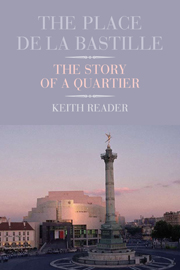Book contents
- Frontmatter
- Contents
- Acknowledgements
- Map by Stephen Ramsay Cartography
- Introduction: The Place de la Bastille
- 1 ‘What's that poor creature doing here?’: the area and the fortress before the Revolution of 1789
- 2 ‘Thought blew the Bastille apart’: the fall of the fortress and the revolutionary years, 1789–1815
- 3 ‘The strategy of the generals of Africa shattered’: the Restoration, Orleanist and Second Republic Years, 1815–1851
- 4 ‘Where is the noise of the storm that I love?’: The Second Empire from Haussmann to the Commune
- 5 ‘Satan's bagpipes’: La Belle Époque's forty-three years of peace
- 6 ‘Villains, stars and everybody in between’: The First War and the entre-deux-guerres
- 7 ‘Slicked hair and splendid sideburns’: Occupation and Liberation
- 8 ‘Let's have some sun!’: post-Gaullism and the Mitterrand years
- 9 ‘A building, not a monument’: the construction of the Bastille Opéra
- 10 ‘A real earthquake’: the impact of the Opéra on the quartier
- 11 Flânerie in the archive: the Faubourg/Bastille today
- Notes
- Bibliography
- Index
11 - Flânerie in the archive: the Faubourg/Bastille today
- Frontmatter
- Contents
- Acknowledgements
- Map by Stephen Ramsay Cartography
- Introduction: The Place de la Bastille
- 1 ‘What's that poor creature doing here?’: the area and the fortress before the Revolution of 1789
- 2 ‘Thought blew the Bastille apart’: the fall of the fortress and the revolutionary years, 1789–1815
- 3 ‘The strategy of the generals of Africa shattered’: the Restoration, Orleanist and Second Republic Years, 1815–1851
- 4 ‘Where is the noise of the storm that I love?’: The Second Empire from Haussmann to the Commune
- 5 ‘Satan's bagpipes’: La Belle Époque's forty-three years of peace
- 6 ‘Villains, stars and everybody in between’: The First War and the entre-deux-guerres
- 7 ‘Slicked hair and splendid sideburns’: Occupation and Liberation
- 8 ‘Let's have some sun!’: post-Gaullism and the Mitterrand years
- 9 ‘A building, not a monument’: the construction of the Bastille Opéra
- 10 ‘A real earthquake’: the impact of the Opéra on the quartier
- 11 Flânerie in the archive: the Faubourg/Bastille today
- Notes
- Bibliography
- Index
Summary
Flânerie is a movement through space; the archive is a deposit in time. The flâneur follows his / her passing impulse; the archivist's avocation is a methodical and classificatory one. Flâneurs may or may not leave a trace of their own; archivists preserve and memorialize the traces of others. For Edmund White, following Walter Benjamin, ‘the flâneur is in search of experience, not knowledge’; for Jacques Derrida, the archive ‘ne sera jamais la mémoire ni l'anamnèse en leur expérience spontanée, vivante et intérieure’ / ‘will never be memory nor anamnesis in their spontaneous, living, interior experience’. Flânerie, to reprise a distinction famously deconstructed by Derrida, might appear to correspond to the supposed spontaneity and immediacy of speech, while the archive is the quintessential domain of the written. This opposition, however, rests on a view of the archive as sedentary, as unproblematically ‘there’, which Derrida's deployment of the notion undercuts, notably when he speaks of the ‘mal d'archive’ / ‘archive fever’ as ‘n'avoir de cesse, interminablement, de chercher l'archive là où elle se dérobe’ / ‘endlessly and incessantly searching for the archive where it hides from sight’. That ‘unsearching search’ is what flânerie, for all its apparent disavowal of anything remotely task-orientated, may be described as doing, which is why it may be regarded not as the opposite of the archive but as its complement.
- Type
- Chapter
- Information
- The Place de la BastilleThe Story of a Quartier, pp. 149 - 160Publisher: Liverpool University PressPrint publication year: 2011



